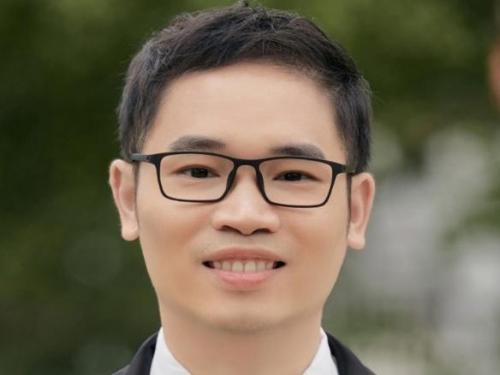Faculty

SELF-INTRODUCTION:
Dr. Jianyang Hu is a Research Assistant Professor of Department of Biochemistry, School of Medicine, Southern University of Science and Technology. In 2020, he graduated from City University of Hong Kong, where he mainly studied 1) the regulation of key transcription factors by triple-negative breast cancer (TNBC) specific super-enhancers; 2) TCOF1 protein regulates the stemness of triple-negative breast cancer cells. During his post-doctoral training at the City University of Hong Kong, he studied the effect of exosomes on metastasis of triple-negative breast cancer. In July 2021, he joined Prof. Xin Hong’s research group at Southern University of Science and Technology, and mainly studies the cellular senescence and metastasis of tumor cells using models such as circulating tumor cells. The overall goal of his research is to provide potential drug targets for the tumor treatment. So far, he has published 13 scientific papers in journals such as Nature communication, British Journal of Cancer, Biochemical Pharmacology, with total citations greater than 480 and H-index equal to 10. He has applied for 3 Chinese patents and 2 US patents. He was funded by the National Natural Science Foundation Youth Project, Shenzhen Science and Technology Innovation Commission - Outstanding Scientific and Technological Innovation Talents Training Project (Youth Project), China Postdoctoral Program and Guangdong Overseas Postdoctoral Talents Support Project.
EDUCATION:
2017. 09- 2020.10 PhD., City University of Hong Kong, HK SAR, P.R. China.
Major: Biomedical Sciences.
2012.09-2015.06 M.S., Jinan University, Guangzhou, P.R. China.
Major: Pharmacology.
2008.09-2012.06 B.S., Guangzhou University of Chinese Medicine, Guangzhou, P.R.
Major: Pharmacy.
WOKRING EXPERIENCE:
2023.08-今 Research Assistant Professor, Medical School, Southern University of Science and Technology of China
2021.07-2023.07 Postdoc, Medical School, Southern University of Science and Technology
2020.10-2021.06 Postdoc, Dept. of Biomedical Sciences, City University of Hong Kong
2017.02 -2017.08 Research Assistant, Dept. of Biomedical Sciences, City University of Hong Kong
RESEARCH:
1) cellular senescence regulation of tumor cells
2) mechanisms of tumor metastasis
3) cell-cell communications, such as through exosome, in the tumor microenvironment
PUBLICATIONS:
1. Huang H#, Hu JY#, Maryam A, Huang QH, Zhang YC, Ramakrishnan S, Li JY, Ma HY, Ma V, Cheuk W, So G, Wang W, Cho W, Zhang L, Chan KM, Wang X* & Chin YR*. Defining super-enhancer landscape in triple-negative breast cancer by multiomic profiling. Nature communications, 2021, 12:2242. (Co-first author, IF:17.694).
2. Hu JY, Lai Y, Huang H, Ramakrishnan S, Pan Y, Ma VW, Cheuk W, So GY, He Q, Lau CG, Zhang L, Cho WC, Chan KM, Wang X, Chin YR. TCOF1 upregulation in triple-negative breast cancer promotes stemness and tumor growth, and correlates with poor prognosis. British Journal of Cancer, 2022, 126:57-71. IF:9.08.
3. Sun HY#, Ou T#, Hu JY#, Yang ZY, Lei QF, Li YQ, Wang G, Li YP, Wu K, Wang SP, Wu S. Nitazoxanide impairs mitophagy flux through ROS-mediated mitophagy initiation and lysosomal dysfunction in bladder cancer. Biochemical Pharmacology, 2021, 190:114588. (# Co-first author, IF:6.1)
4. Zhuo ZZ#, Hu JY#, Chen MF, Lei XP, Deng LJ, Yao N, Peng QL, Chen ZS, Ye WC *, Zhang DM*. Ailanthone Inhibits Huh7 Cancer Cell Growth via Cell Cycle Arrest and Apoptosis In Vitro and In Vivo. Scientific reports, 2015, 5: 16185. (# Co-first author, IF: 4.997)
5. Zhou M, Li WP, Li J, Xie LM, Wu RB, Wang L, Fu S, Su W, Hu JY, Li PL. Phase-separated condensate-aided enrichment of biomolecular interactions for high-throughput drug screening in test tubes. Journal of Biological Chemistry, 2020, 295(33): 11420-11434.
6. Liu JS., Huo CY, Cao HH, Fan CL, Hu JY, Deng LJ, ... Yu ZL. (2019). Aloperine induces apoptosis and G2/M cell cycle arrest in hepatocellular carcinoma cells through the PI3K/Akt signaling pathway. Phytomedicine, 2019, 61: 152843.
7. Sun HY, Huang MH, Yao N, HU JY, Li YJ, Chen LP, HU N, Ye WC, Tai WillamChi-Shing, Zhang DM, Chen SB. The cycloartane triterpenoid ADCX impairs autophagic degradation through Akt overactivation and promotes apoptotic cell death in multidrug-resistant HepG2/ADM cells. Biochemical Pharmacology, 2017, 146: 87-100.
8. Chen LP, Mai WQ, Chen MF, Hu JY, Zhuo ZZ, Lei XP, Deng LJ, Liu JS, Yao N, Huang MH, Peng YH, Ye WC, Zhang D. Arenobufagin inhibits prostate cancer epithelial-mesenchymal transition and metastasis by down-regulating β-catenin. Pharmacological research, 2017, 123: 130-142.
9. Chen MF, Lei XP, Shi CZ, Huang MH, Wu BJ, Li ZQ, Han WL, Du B, Hu JY, Nie QL, Mai WQ, Ma N, Xu NH, Zhang XY, Xia MH, Luo LP, Ma Ande, Li HS, Yu Q, Chen HRR, Zhang DM, Ye WC. Targeting tumor pericytes with a FAP-alpha-activated prodrug combats tumor resistance to vascular disrupting agents. Journal of Clinical Investigation, 2017, 127(10): 3689–3701.
10. Lei XP, Chen MF, Nie QL, Hu JY, Zhuo ZJ, Yiu A, Chen HR, Xu NH, Bai LL, Zhang DM*, Ye WC*. In vitro and in vivo antiangiogenic activity of desacetylvinblastine monohydrazide through inhibition of VEGFR2 and Axl pathways. American Journal of Cancer Research, 2016, 6(4):843-858.
11. Sun HY, Liu BB, Hu JY, Yang XL, Xu LJ, Chan SW, Chan CO, Daniel K.W. Mok, Zhang DM*, Ye WC*, Chen SB*. New cycloartane triterpenoid from Cimicifuga foetida induces mitochondrial apoptosis in human breast carcinoma MCF-7 cells via inhibiting Raf/MEK/ERK pathway and Akt phosphorylation. Chinese Medicine, 2016, 11(1): 1-11.
12. Zhang W, Huang XJ, Zhang SY, Zhang DM, Jiang RW, Hu JY, Zhang XQ, Wang L*, Ye WC*. Geleganidines A–C, Unusual Monoterpenoid Indole Alkaloids from Gelsemium elegans. Journal of natural products, 2015, 78(8): 2036-2044.
13. Hu JY, Chen MF, Lei XP, Zhuo ZJ, Sun HY, Chen ZS, Shi Z, Zhang DM*, Ye WC*. Bufalin induces apoptosis of MDA-MB-231 cell through activation of JNK/p53 pathway. Journal of Cancer Research Updates, 2015, 4(2): 47-53.


